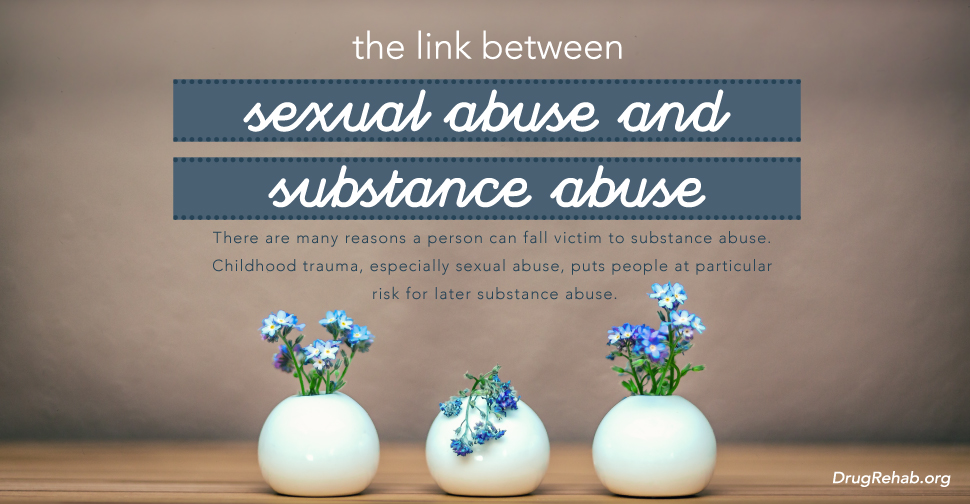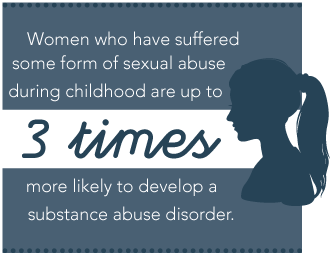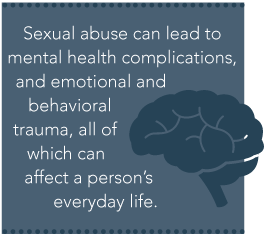
There are many reasons a person can fall victim to substance abuse. Childhood trauma, especially sexual abuse, puts people at particular risk for later substance abuse. In fact, women who have suffered some form of sexual abuse during childhood are up to three times more likely to develop a substance abuse disorder, according to the National Institute on Drug Abuse. Further, substance abuse disorders were found to be associated more closely with sexual abuse than were any other mental disorders. Because of this staggering truth, it is important to recognize the signs of sexual abuse, and to put in place protective factors to prevent it and to prevent further substance abuse.
Sexual Abuse Defined
The American Psychological Association (APA) defines sexual abuse as, “unwanted sexual activity, with perpetrators using force, making threats or taking advantage of victims not able to give consent.” Sexual abuse occurs in many ways and has several forms. Victims of abuse usually know the perpetrator. There are also some defining characteristics which comprise sexually abusive events, such as:
- An incident in which the perpetrator asks the victim to do something sexual
- The perpetrator kisses/hugs the victim in a sexual way
- The perpetrator exposes his or her genitals to the victim
- The victim gets sexually fondled
- The victim is made to touch the perpetrator in a sexual way against the victim’s will
- (Attempted) intercourse
 Victims may react with fear or shock. The event may also make the person experience denial, as they’re unable to believe it happened to him or her. Sexual abuse may ultimately cause a person to become shy, withdrawn, or to develop any number of mental disorders, or even more likely, a substance abuse disorder. Effective treatment for survivors may include a number of therapies, including group therapy and writing as therapy.
Victims may react with fear or shock. The event may also make the person experience denial, as they’re unable to believe it happened to him or her. Sexual abuse may ultimately cause a person to become shy, withdrawn, or to develop any number of mental disorders, or even more likely, a substance abuse disorder. Effective treatment for survivors may include a number of therapies, including group therapy and writing as therapy.
How Is Substance Abuse Defined?
Though substance abuse and addiction has previously been viewed as a weakness of character by some, it is now known that it is a disorder which has deep underlying causes. It is characterized by a continual pattern of abuse, even if a person knows that this pattern may be harmful. Substance abuse can lead to health problems, severe bouts of withdrawal, and other issues with life, such as troubles at work, school, or with family. Many things contribute to substance abuse risk. These are called risk factors. For children and adolescents, these include:
- Lack of parental involvement
- Lack of nurturing
- Substance abuse on the part of someone who cares for the child
In contrast, parents and other caregivers present in a child’s life can fight the risk of substance abuse by implementing protective factors. Some ways to utilize protective factors are providing a stable home and environment, nurturing care, and a strong support system. When protective factors are not in place, substance abuse is more likely to occur. Lack of protective factors may also affect the likelihood of sexual abuse.

Adults may encounter other risk factors, however, they may be yet affected by risk factors that occurred as a child or adolescent. In addition to sexual abuse that may have occurred as a child or as an adult, the following are some examples of substance abuse risk factors that may be present for an adult:
- Genetic disposition
- Being male
- Mental health disorders
- Lack of family support
- Low self-esteem
- Peer pressure
Various protective factors may exist for adults as well, including a strong support system, developing coping skills, and limiting access to drugs or alcohol.
How Does Sexual Abuse Contribute To Substance Abuse?
An article posted by the National Child Traumatic Stress Network (NCTSN) reports that one in four teens is subject to a traumatic event before reaching age 16. Adolescents often have high exposure to substances, and traumatic events can cause them to turn to drugs or alcohol to cope. The article by NCTSN further states, “Although it is unclear exactly how many adolescents who abuse drugs or alcohol also have experienced trauma, numerous studies have documented a correlation between trauma exposure and substance abuse in adolescents.” It is important to note, that an adult can also experience sexual abuse which may impact them in a manner that leads to substance abuse.
The relationship between sexual abuse and substance abuse can be a rocky one; each may contribute to the occurrence of the other. For young people this means that experiencing a traumatic event will increase their chances of falling victim to substance abuse, while engaging in substance abuse will put them at further risk for being involved in a traumatic event. For example, teens who have been involved in a traumatic event may begin abusing alcohol, seeking its numbing effects, in an attempt to not feel harsh post-traumatic emotions. In addition, post-traumatic stressors make it even more difficult for teens to stop substance abuse.
 In the same token, teens who are abusing substances put themselves at risk for a traumatic occurrence. This is partly due to the effects associated with some substances—certain drugs may cause a person to seek thrills or experienced impaired judgement, resulting in risky behavior. To make matters more difficult, having these co-occurring disorders make it difficult for a person to deal with the myriad of emotions and behavioral changes he or she experiences.
In the same token, teens who are abusing substances put themselves at risk for a traumatic occurrence. This is partly due to the effects associated with some substances—certain drugs may cause a person to seek thrills or experienced impaired judgement, resulting in risky behavior. To make matters more difficult, having these co-occurring disorders make it difficult for a person to deal with the myriad of emotions and behavioral changes he or she experiences.
Traumatic events and substance abuse can become a vicious cycle. Left untreated, each could lead to a number of side effects. Sexual abuse can lead to mental health complications, and emotional and behavioral trauma, all of which can impact a person’s everyday life. Substance abuse can influence a person’s health, put a person at risk for withdrawal or even overdose, and can affect daily life fulfillment. However, many treatment methods are available for both sexual abuse and substance abuse, and several methods can be quite effective for recovery.
Treating Sexual Abuse And Substance Abuse
Co-occurring disorders, or two disorders that occur at the same time, require a treatment plan which addresses the symptoms of each disorder. For sexual abuse victims, treatment may include different types of therapies, such as individual or group, and could include medications, such as antidepressants.
Substance abuse treatment may include a combination of methods as well, like cognitive behavioral therapy, counseling, and medication. People may recover in a facility such as a rehabilitation center or, in some severe cases, a hospital. This inpatient process allows for a person to heal in a system with full support and medical or professional care. People who are not at high risk may be able to complete treatment in an outpatient process at home with a strong personal support system.
There are many things to consider when deciding on a proper treatment method. Though necessary, recovery can be a costly experience. Location, funding, health conditions, and amount of support are all factors to take into consideration. It is important to have resources, information, and professional advice at your disposal when selecting options.
Finding Treatment That Is Best For You
 Treating sexual abuse and substance abuse can be a delicate process. Post-traumatic stress can make it difficult to seek care, or to deal with overwhelming emotions. The good news is that treatment is available to help you or your loved one have a chance at a new, fulfilled life.
Treating sexual abuse and substance abuse can be a delicate process. Post-traumatic stress can make it difficult to seek care, or to deal with overwhelming emotions. The good news is that treatment is available to help you or your loved one have a chance at a new, fulfilled life.
If you are struggling, or if you know someone fighting sexual abuse or substance abuse, you do not have to fight alone. Contact us today at DrugRehab.org to find out more information, learn about resources, and get in contact with professionals who will aid you in your recovery journey.
Sources
National Institute On Drug Abuse — DrugFacts: Understanding Drug Addiction
National Institute On Drug Abuse — What Are The Early Signs Of Risk That May Predict Later Drug Abuse?

